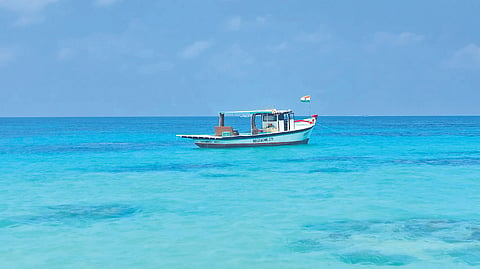

AGATTI: Public discontent with the current administrator of Lakshadweep, Praful Khoda Patel, has been lingering for a while. Since taking charge, Patel has introduced several controversial policies in the tranquil cluster of islands, including a beef ban, rejecting permission for people with more than two children to contest local elections and acquiring land in the name of development.
As the spotlight falls once again on the archipelago, this time to do with tourism, people are both elated and apprehensive of the authorities’ next move. Many are pointing to the administration’s aggressive move to take over people’s land, claiming them to be ‘pandaram’ (government) land, completely disregarding the islanders’ hereditary rights.
Cheriya Koya, a 70-year-old resident of Kavaratti, is on the verge of losing 2,070 sq mtr of land his family has owned for ages. In 2018, the Registrar of Cooperative Societies entered into a three-year rental agreement with Koya to construct an LPG godown on the land. Till around 2021, he received rent without fail. In the meantime, the administration changed and started claiming pandaram lands. “The agreement clearly mentions the government would pay Koya rent for the first three years, after which it would acquire the land by providing adequate compensation, based on land value at the time of acquisition. However, after the current administrator took charge, not only did he stop disbursing the rent, but also geared up to claim the property as government land without paying compensation. How can he claim it as government property when the agreement mentions Koya as the owner?” says Saleem, Koya’s advocate on the case in the District and Sessions Court in Kavaratti
Saleem says this is not an isolated case. The government has acquired several acres of land in this manner.
What is pandaram land?
“Around 60% of land in Lakshadweep, which includes some parts of the Androth, Kalpeni, Kavaratti, Minicoy, and Agatti islands, along with six uninhabited islands, constitutes pandaram land, says Lakshadweep MP Mohammed Faizal. “Lakshadweep has been inhabited since 13 AD and pandaram land dates back to the rule of the Arakkals from the mid-1500s. When Arakkal Aisha became the ruler, she entered into an agreement with the islanders giving them the rights to cultivable land,” he said.
“When the British took over, they retained the policy. After independence, the land came under the possession of the Indian government for the time being. In 1965, revenue and tenancy regulations were framed that described pandaram land as land on which the administration had a proprietorship immediately before the enactment of legislation. Which means that once the rules are in place, government ownership ends,” the MP said.
“Those who signed the agreement during the time of Arakkal Aisha and the British, and individuals whose names made it to the land registry in 1965 own the land. Islanders possess all the documents to show their ownership, which is why the government gave them compensation when it acquired the land for development projects, like the Agatti airport.”
The only issue that existed, according to Faizal, was that to claim ownership, people had to apply for conformity of occupancy with the Lakshadweep administration. Between 1988 and 2013, applications were invited for occupancy rights, a process in which people fully cooperated.
“However, only if one has occupancy rights can he/she sell the land to someone or else it will automatically be transferred to their heirs. Unaware of this clause, many transferred the land. The current administrator is citing these transactions as illegal and taking over our lands. If it wasn’t people’s land, then why were we given compensation earlier?”
A Misbah, social activist and former member of the home ministry’s advisory committee for Lakshadweep, says the entire land held by islanders, who are considered scheduled tribes, is specially protected under the LMA Island Protection of Scheduled Tribe Regulation 1964. “No civil court or authority can issue any order to take away their ownership and title. The amendments made to the 1965 Land Revenue and Tenancy Regulations in 2020 by inserting Section 15A were to regularise or legalise all transactions and developments on Pandaram lands held by the islanders. The high-power Niti Aayog committee, the National Commission for STs, UT administration and home ministry recommended that to facilitate economic development. It was approved by the Union cabinet, chaired by PM Modi, as well. However, the new administrator has now notified another amendment to the same regulations, and repealed Section 15A. This action is not intended for the welfare of the islanders.”
Anyone visiting Lakshadweep now can see a long stretch of coconut trees painted white and red. Residents say they have been marked to be cut down to facilitate road widening and other development activities. “Most of the trees come under the lands of the local people. Moreover, the administration has offered to pay only `60 for each tree and no money for the land. How is that development?” asks a resident of Agatti.
All the proposed development activities will remain on paper, says Faizal. “Will anyone be interested in investing in land that is mired in dispute? The administration has been taking over our lands without prior notification, completely ignoring our rights. Many of us have approached the court against this and obtained a stay. So no investor would be interested in ending up in a legal deadlock. While we are all happy that the government is considering the development of Lakshadweep, such ambitious agenda will work only if they are pro-people,” he stresses.
Though TNIE contacted administration officials, no comments were forthcoming.